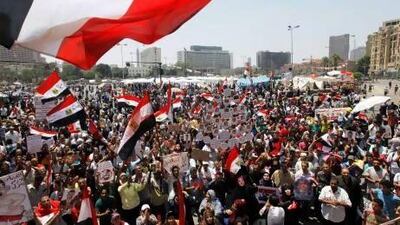CAIRO // Al Azhar, Egypt's highest religious authority, warned of "civil war" as at least one person was killed during rival protests across the country on Friday.
"Vigilance is required to ensure we do not slide into civil war," said a statement from Al Azhar, which appeared to support President Mohammed Morsi just two days before opposition groups are planning major demonstrations calling for him to resign on the first anniversary of his term in office.
One person was killed and 85 wounded in Alexandria yesterday as groups for and against the president clashed. The man who died was killed by birdshot, officials said but it was unclear if he was a Morsi supporter or opponent.
Two offices of the Freedom and Justice Party, the political arm of the Muslim Brotherhood, were torched, one in Alexandria and the other in Aga in the Nile Delta, security officials said.
In Cairo, tens of thousands of Mr Morsi's backers filled the street outside the Rabia El Adawiya Mosque, not far from the presidential palace.
"I came to support the legitimate order," said Ahmed Al Maghrabi, a 37-year-old shopkeeper from Mansoura, who had come to Cairo to protest. "I am with the elected president. He needs to see out his term."
Meanwhile, anti-government protesters, in fewer numbers, streamed into Tahrir Square accompanied by security forces and an ambulance, held up red cards chanting, "Down with Morsi and the Brotherhood."
Egypt has been on edge this week ahead of the protests and after five Muslim Brotherhood supporters were killed in violence over the past week, which Al Azhar's clerics blamed on "criminal gangs".
More than two and a half years after Hosni Mubarak was forced out of office by an uprising, political fighting has left Egypt more combustible and polarised than ever. Mr Morsi, a former high-ranking official in the Muslim Brotherhood, has antagonised liberal and secularist groups with what they have described as a gradual takeover of the government starting only months into his term.
The umbrella opposition group, the National Salvation Front, has dug in for a long-term fight, refusing to meet the president or his team unless he appoints a "unity" government and opens up decision-making to a wider spectrum of political groups. Loosely affiliated with the front are more militant groups, including the Tamarod, or Rebel, movement, which has been collecting signatures on a petition calling on the president to resign.
Backed by the Brotherhood, its political arm and Islamist allies, Mr Morsi has refused to back down and cast his opponents as a loud minority intent on dominating the country without a popular mandate. The opposition has said the president's calls for dialogue were empty politicking because he was unwilling to make concessions.
On Wednesday, attempting to calm his opponents before the planned protests, Mr Morsi renewed calls for dialogue and admitted he made mistakes during his first year. But he was seen by many as defiant and accusatory, blaming many of the country's problems on a conspiracy from remnants of the Mubarak regime.
The Freedom and Justice Party, formed by the Brotherhood in 2011, has taken a more excoriating tone.
It warned of "dire consequences that will pull the country into a violent spiral of anarchy" and said it held liberal leaders, such as the Nobel Peace laureate Mohamed ElBaradei, responsible for inciting violence.
Opposition leaders, including Mr ElBaradei, have also condemned the violence that led to the deaths of Brotherhood supporters during the past week. But they have also blamed Mr Morsi for creating a poisonous environment in Egypt that is deepening divisions.
The protracted stand-off has weakened the economy, raised unemployment and made daily life more difficult for the country's poorest. Long queues are a regular sight outside of petrol stations because of shortages.
Observers believed yesterday's fracas in Alexandria and similar tense scenes around the country were only a preview of tomorrow, when liberals are trying to marshal huge numbers into the streets. Many are afraid that clashes will break out, initiating another cycle of violence and protests that could last for days or weeks. More than 800 people died during the 2011 uprising against the Mubarak regime and hundreds more have died since in periodic explosions of street violence.
The army, which refused to use force against protesters during the 2011 uprising, said last week that it would not allow political battles to drag the country into further violence.
On June 23, the defence minister, General Abdel Fattah El Sisi said: "The armed forces have avoided politics in the past period, yet the national and moral responsibility of the forces towards their people obliges them to intervene to stop Egypt from slipping into a dark tunnel of civil fighting and killing, or sectarianism, or collapse of the state institutions."
Both sides saw the remarks as supporting their cause, leaving unclear whether the military was willing to again enter the fray in Egypt.
bhope@thenational.ae
* With additional reporting by Reuters

